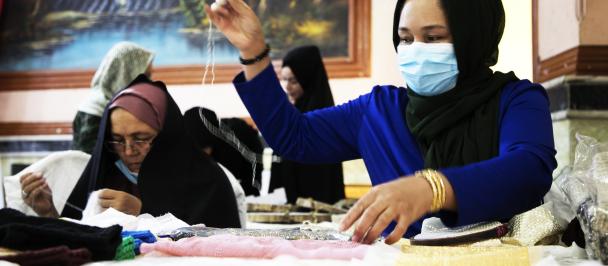UNHCR, the UN Refugee Agency, with the UN Development Programme, UNDP, are working in the 80-designated Priority Areas of Return and Re-Integration (PARRs) which are part of UNHCR’s Community-based Protection and Solutions Programme Response (Co-PROSPER) strategy and UNDP’s Area-Based Approach for Development Emergency Initiatives (ABADEI).

Kabul, Afghanistan, 6 December 2022
UNHCR, the UN Refugee Agency, with the UN Development Programme, UNDP, are working in the 80-designated Priority Areas of Return and Re-Integration (PARRs) which are part of UNHCR’s Community-based Protection and Solutions Programme Response (Co-PROSPER) strategy and UNDP’s Area-Based Approach for Development Emergency Initiatives (ABADEI).
Communities throughout Afghanistan have witnessed very significant voluntary returns of internally displaced people (IDPs) since early 2021. UNHCR’s household level assessments have found that some 1.23 million IDPs have voluntarily returned, including more than 211,000 people so far in 2022. Voluntary returns of refugees this year have surpassed 6,000, a figure not seen since 2019.
The two partner agencies’ work in the PARR areas is focused on delivering basic services to enhance the absorption capacity of communities while also facilitating the sustainable reintegration of those internally displaced people (IDPs) and refugee returnees who are voluntarily arriving back.
“UNDP’s and UNHCR’s joint work deliver services and opportunities to communities, essential to stabilise populations and mitigate risks of future displacement,” said Abdullah Al Dardari, UNDP Resident Representative in Afghanistan. “By working in unison, UNHCR and UNDP are supporting people in a phased manner from humanitarian to development responses.”
UNHCR is implementing humanitarian interventions and a solutions-based approach for returnees in the 80 PARR areas throughout Afghanistan, including 75 districts and five cities, uniting short- and medium-term community-based protection initiatives with longer-term development projects.
“The collective impact of our joint activities in conjunction with UNDP helps avoid protracted dependency,” declared Leonard Zulu, UNHCR Representative to Afghanistan.” Injecting development approaches in every stage of a crisis is key to achieve solutions for Afghan returnees and impoverished host communities.”
Since the PARR areas were first designated in 2019, they have gradually expanded in number. Over the last four years UNHCR has constructed 105 schools, 39 basic health centres, 508 water networks/wells, 55 irrigation canals, 209 culverts, paved 230 kms roads, provided shelter and cash for shelter and solar power to over 12,100 families numbering over 84,000 people, as well as projects including livelihood schemes, cash for work initiatives, and supporting women’s engagement. So far this year, some 2.7 million people have benefited from UNHCR’s assistance in the 80 areas, which overall are home to 19.2 million Afghans.
“In Afghanistan, UNHCR’s work with UNDP provides for humanitarian to development handover that brings vital stability to communities,” UNHCR’s Zulu said.
In the past year, UNDP Afghanistan through its flagship programme ABADEI has tested and provided 6.4 million people with primary care delivery including antimalarial, HIV and TB treatment, 560,000 Afghans’ livelihoods have improved with temporary jobs and livelihood inputs, 300,000 Afghans improved access to energy, 165,000 people learned about the risk of unexploded ordnance, 34,000 women-led businesses received financial and technical support and 13,830 vulnerable households received unconditional cash across all 34 districts in Afghanistan.
The end of large-scale armed conflict in 2021 resulted in an improvement in security and a marked reduction in civilian casualties, also enabling humanitarian access to all provinces in of Afghanistan. The humanitarian needs of the people of Afghanistan remain vast. Some 24 million Afghans are in urgent need of life-saving humanitarian assistance, conditions posing significant challenges to creating a conducive environment for the voluntary and sustainable return and reintegration of Afghans.
The Priority Areas of Return and Reintegration (PARR) initiative sees UNHCR closely engage with partners including UNDP, UN-Habitat, FAO, UN-Women, ILO, UNICEF, UNWFP, UNODC, AKDN and key donors to assist returnees with critical area-based support that alleviates the dire humanitarian situation, builds resilience, and creates steps for stability.
UNHCR Afghanistan’s Priority Areas of Return and Reintegration are an important part of the international effort to provide solutions for Afghan refugees under the Solutions Strategy for Afghan Refugees (SSAR). UNDP is the core group member of the Support Platform for SSAR, and in Afghanistan through ABADEI is working to address the root causes of forced displacement and achieve solutions for people returning home. End
FOR MORE INFORMATION, PLEASE CONTACT:
Peter Kessler
Senior Communications Officer
UNHCR Kabul
+93 70 2465 614 e-mail: Kessler@unhcr.org
Farhad Zalmai Sayeed
Partnerships and Communications Associate
UNDP Afghanistan
+93 79 0509 133 e-mail: farhad.zalmai@undp.org

 Locations
Locations



